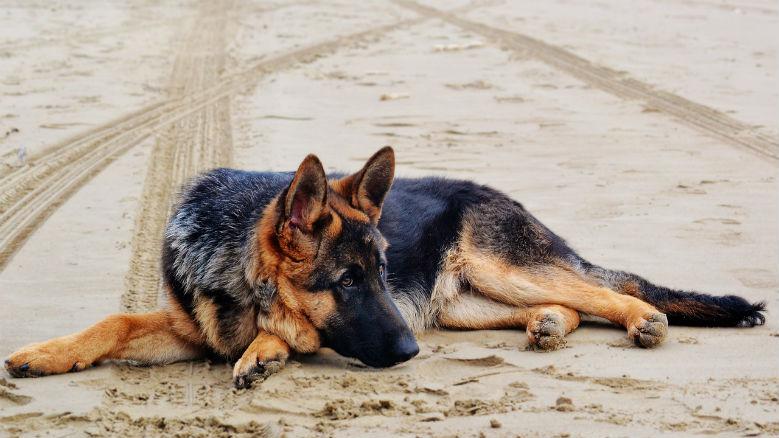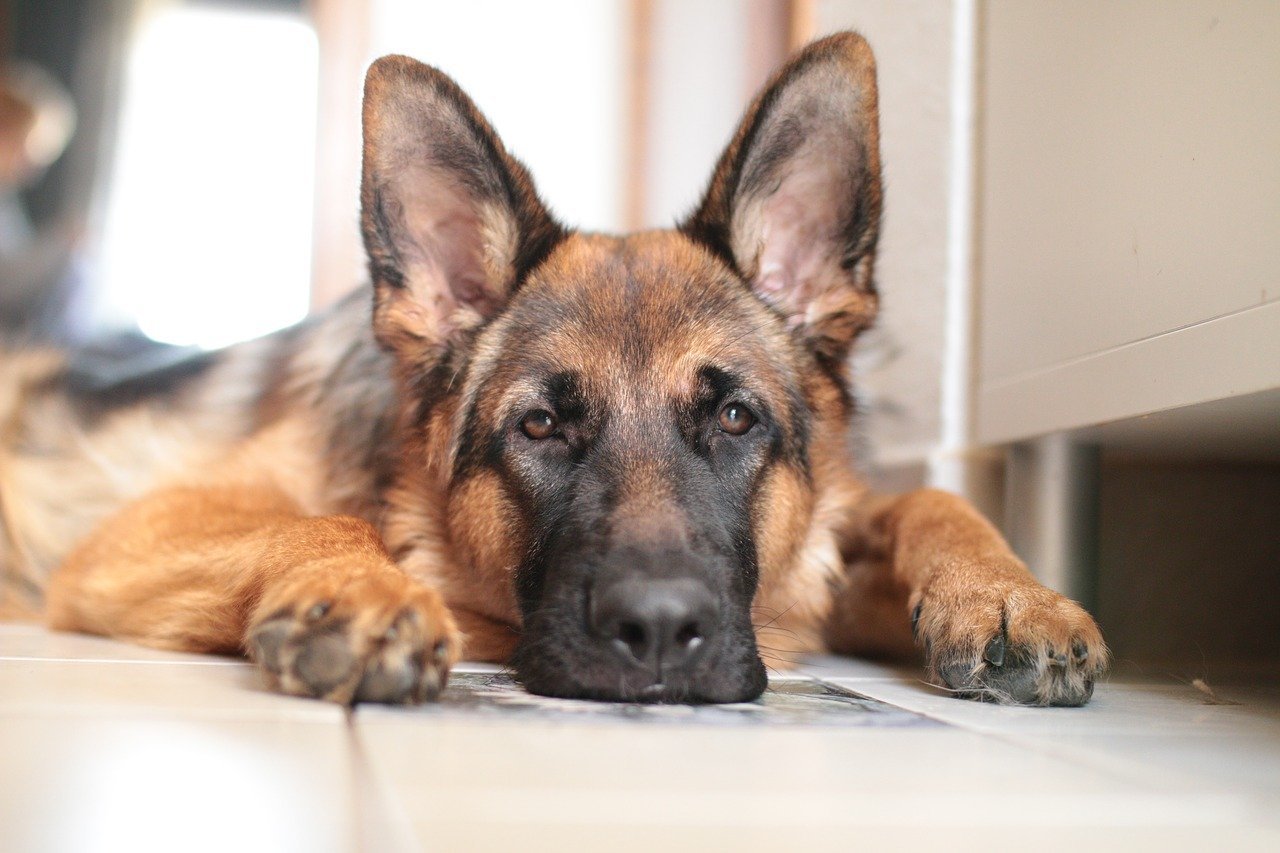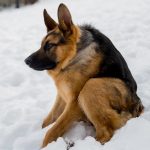It is very common for dogs to experience separation anxiety and one of the most affected breeds is German Shepherds. Many factors can influence separation anxiety, such as genetics, training, temperament, health problems, and parents’ temperament.
This stage can be paralyzing for dogs and occurs when your pet is terrified when separated from the rest of the family. Here you can learn a little more about German Shepherd separation anxiety.
What is GSD Separation Anxiety?
Contents
This is a stage that is very common in dogs and especially in the German shepherd. This is a very affectionate breed, and they are very loyal; they are dogs that love to spend a lot of time with their owners and protect them from threats. But German Shepherds show signs of aggression and become weak when left alone.
They feel a sense of anxiety and stress that can become a problem and must be treated early to prevent it from causing an accident. If you observe that your dog reacts badly when you go out, you will see that it will cause problems and not want to go out.
Your German shepherd will display destructive behavior when left alone, chewing on things, chewing on furniture, and barking constantly.
Why is separation anxiety common in German Shepherds?
One of the most common reasons your German shepherd gets anxious is separation anxiety. As they are very affectionate dogs, they do not like to be alone, and they get stressed. You will see that your dog will get anxious when he is about to leave. You should avoid leaving it alone for very long periods,
How do you know if your German shepherd has the separation anxiety?

It can be hard to tell if your dog has separation anxiety or something else is wrong with him. When your German shepherd has separation anxiety, he will start howling and barking more frequently.
Symptoms
Depending on the severity of the problem, your German shepherd may have the following symptoms:
-
Howling and barking
A dog with separation anxiety will bark and howl more when left alone or separated from its owner. It is a type of howl and bark that is persistent and will only appear when you feel it will be left alone.
This is one of the most common signs of this problem in German Shepherds. Giving him chew toys and treats from time to time can be beneficial for dogs. You should avoid showing too much affection for him when he is about to leave because it will make the situation worse. You will feel excessive licking.
-
Urinate and defecate
Some dogs urinate and defecate when left alone.
-
Drool frequently
German Shepherds do not drool very often; if you notice that your dog is drooling more than normal, he may be suffering from separation anxiety.
-
Chew, dig, and destroy
Dogs that suffer from separation anxiety usually chew on objects, furniture, door frames, and everything in their path. These behaviors can lead to injuries to the dog, such as cut legs, broken teeth, damaged nails, etc. All this happens when the owner is not in the house.
-
Escape
A German Shepherd suffering from separation anxiety may attempt to escape his confined space by leaving him alone. You will see how you damage the doors to try to escape.
-
Watch your German Shepherd chew on its paws
It’s common for German Shepherds suffering from separation anxiety to bite their paws more often.
Causes
It is not known exactly why dogs experience separation anxiety. Dogs that are adopted from shelters can suffer from anxiety and have had to overcome their owner’s death. Possible causes are:
-
Change of owner or family
If the dog has been abandoned or given to another family, it may develop separation anxiety. This stage must be treated immediately so that the dog does not suffer and does not become a problem for the owners.
-
Schedule change
If they feel a sudden change in schedules, how long you leave them alone can cause this anxiety. If you work at home and spend all day with your dog and suddenly get a job outside the home, you will see that the German shepherd will develop separation anxiety.
-
Change of address
If the dog moves house, it can cause anxiety until it gets used to its new residence.
-
Change in household membership
If there is a sudden absence of a family member, your dog may suffer from separation anxiety due to death or moving.
How Is Separation Anxiety Treated In GSD Dogs?
If you want to treat your German shepherd’s separation anxiety, you can take the following steps:
1. You must give your German Shepherd dog plenty of exercises
Sometimes it is very difficult to alleviate your German shepherd’s separation anxiety, but with exercises and doing routines with your dog. You must ensure that your dog exercises every day before you go out.
In this way, the German shepherd will be tired and exhausted and will not worry about his departure. Many experts say that dogs that are not anxious will not panic when left alone. Give your dog something to chew on to alleviate this anxiety problem while you return.
2. You must make changes in your daily routine
You should try to get your dog to get used to the fact that you should leave your house without taking him. You can perform the exercise of going outside every day without actually going out; you can start by getting up without giving your dog any signal or warning.
If you don’t give your German shepherd a lot of affection before leaving and going through the departure routine, you will find that your dog will no longer associate your departure with a separation. You won’t panic when you feel like you must leave your home.
Pay no attention to your dog when he starts whining or whining; although it is difficult to ignore your German shepherd, you should do so for his sake. Keep the distance between your act of leaving and your dog, so you don’t make things worse.
3. You must stay calm
This is advice for German Shepherd owners; if you react to anxiety with love, you will achieve nothing. As mentioned above, your dog will become more anxious. Always be calm when you leave.
Frequently Asked Questions
Do GSDs suffer from the separation anxiety?
It’s typical for dogs to have the separation anxiety, and GSDs are really significantly affected. There’s a horde of factors which might bring about separation anxiety, which includes genes, training, health issues, temperament, and many mental and physical health issues.
So why do German shepherds cry a lot?
GSDs cry since they may feel uncomfortable about a particular situation, such as pain, separation anxiety, or perhaps hunger. And when they are uncomfortable, the natural reaction could be to cry. They could also cry when they come across or even discover one thing they believe is essential and needs the attention of yours.
Does a GSD feel alone during the day?
And GSDs should not be left alone for more than four hours. And young puppies and seniors should not be left alone for more than 1 to 3 hours. Then, provide them with enough water and food before you leave and provide them with lots of physical exercises.
Do you need to crate a German shepherd dog with separation anxiety?
The crate training may be really good for dogs that experience separation anxiety. Having a location where they feel secure and could settle down while alone is beneficial while they undergo therapy for separation anxiety and stops them from embarking the bad behavior around the house.
Just how can I make your German shepherd calm down?
To be able to instruct your dog to calm, training having him to do obedience workouts within the presence of distractions to construct focus and self-control. Train the dog of yours to ‘sit,’ then simply training to own him ‘stay’ and ‘sit’ for a few seconds before he’s permitted to go over to something thrilling.




